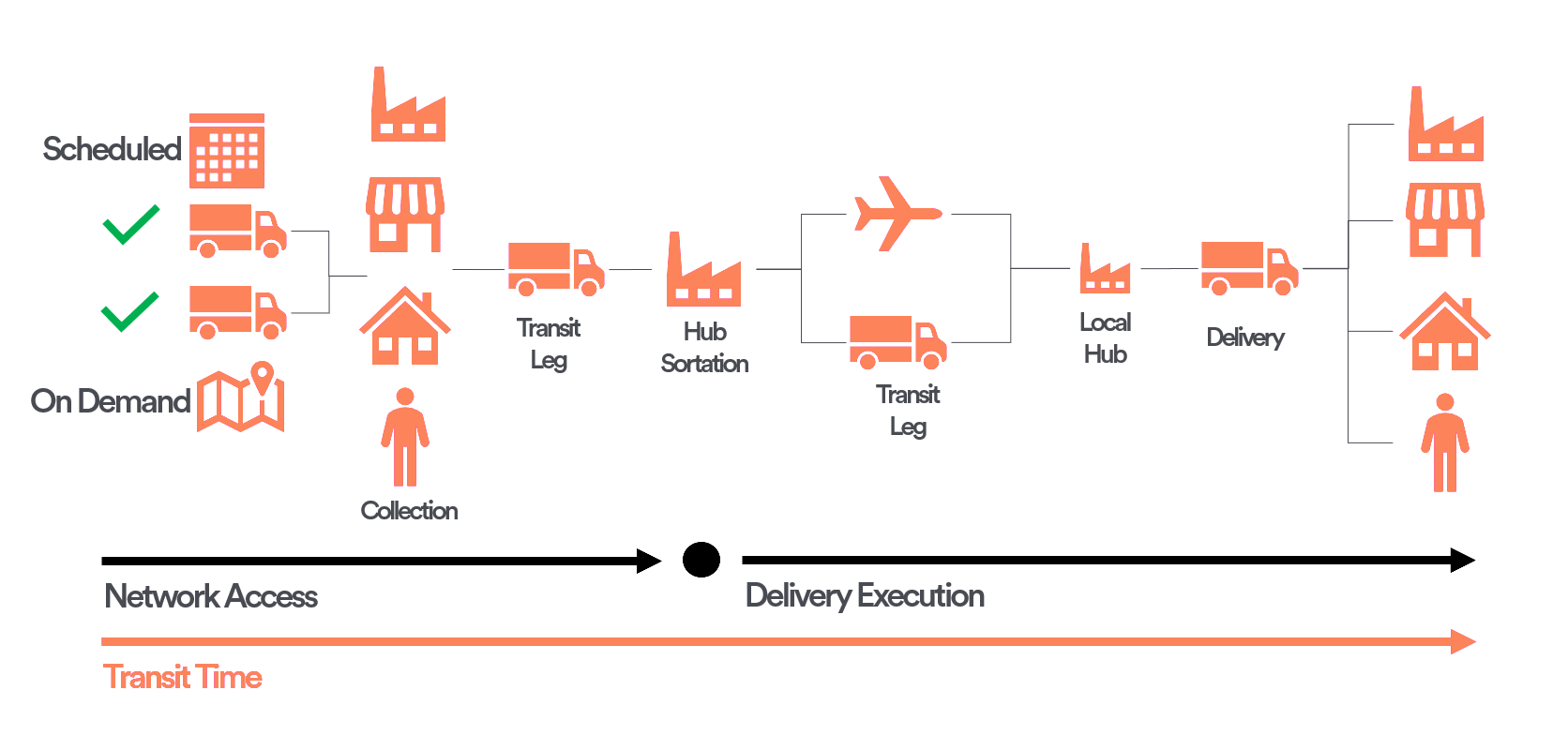Ship Explained: Our shipping solution
Learn more about Ship and uncover the essential digital components known as Shipping Data Units (SDUs), the key data elements that represent a parcel and its journey from warehouse to doorstep.
Introduction
Ship is Sorted’s powerful delivery management system, built to give retailers flexibility and control over their shipping operations. Within Ship, are two core platforms:
- Consignments, designed for high-volume, warehouse-based scheduled shipping; and
- Shipments, was released following Consignments, and represents a more flexible approach to support on-demand delivery models.
These two profiles sit side-by-side. Together, they form the backbone of our Ship operations service. Think of them not as replacements or rivals of each other, but as approaches that meet different operational needs.
Both platforms integrate with carrier services and support the full delivery lifecycle of packages from allocating a carrier service, creating package labels and then manifesting to a carrier for delivery. Both services take the data of a parcel (known as a shipping data unit) and transform it throughout the journey from warehouse to delivery.
What is an SDU?
While Consignments and Shipments serve different fulfillment strategies in the Ship platform, both share the common ground of a structured, multi-legged delivery journey built with shipping data units (SDUs).
An SDU is the digital information formed when a customer places an order and is registered in the Ship platform. Ship then takes this data and transforms it, starting with the package contents, weights and dimensions then, adds the required delivery dates and journey legs, along with any customs documentation (critical for international shipping) and any customised metadata.

Think of an SDU as a digital box of data that’s continuously adding detail to the customer’s package as it travels from warehouse, to carrier delivery, to the customer’s door.
An SDU not only helps Ship process your package data, but it also provides the vital manifest information for carriers to deliver effectively and helps track and audit your shipments going forward.
Sorted Ship
Both the Consignments and Shipments platforms come with their distinct user-interfaces and API data contracts (the tools that transform your SDUs) although, we’re actively working to unify their functionality into one dedicated Ship user-interface, please view our Sorted product vision for more detail.
Consignments platform
The Consignments platform represents a scheduled, centralised delivery model, typically originating from a fulfillment centre with a fixed collection schedule.
If you are a subscribed customer, click to log in to the platform.
The platform was built for high volume shipping from warehouses to end consumers. In this model, Consignments can ship thousands of items for a customer daily, with carriers making regular scheduled collections from a small number of fulfilment centres, before taking the goods to their own hubs and then shipping out to the end customer.
In order to send a package in a scheduled workflow, Consignments requires a shipping location and a scheduled collection datetime. An example scheduled workflow is provided below:

Consignments API
The Consignments API (or data contract), is the data agreement that we provide to our Consignments customers on what properties can be sent and requested to interact with our systems and integrated carriers. This works in conjunction with the Consignments user-interface.
The Consignments API is designed for structured, scheduled delivery workflows typically from centralised fulfillment centres or warehouses. It’s optimised for high-volume operations with predictable pickup windows.
What it does:
- Create and manage consignments (a group of parcels going to the same destination)
- Offer flexible options for delivery time slots and pickup locations
- Allocate carrier services based on predefined rules
- Generate shipping labels
- Produce customs documents (for international shipping); and
- Options to cancel or rebook consignments
For a full list of the API endpoints and data properties in the API package, please visit our Consignments API reference documentation.
If you’d like to learn more about the differences between the Consignments and Shipments API packages, check out our detailed article.
Shipments platform
The Shipments platform supports both scheduled and on-demand delivery models, allowing for flexibility in collection points, perfect for distributed fulfillment models like ship-from-store, drop shipping, and local hubs. An example Shipments scheduled workflow is provided below.
If you are a subscribed customer, click to log in to the platform.
On-demand shipping enables you to be more flexible in the way that goods are collected, and helps you to avoid the risk that warehousing from a single location can bring in a modern retail environment. Sorted Shipments gives you the ability to ship from thousands of locations all over the world.

Shipment grouping
To further optimise your shipments process, a unique feature in Shipments, is you can group any shipments that you want to send together. This allows for multiple shipments to be manifested in a single action. For more information see our guide on creating shipment groups.
Create shipping rules
In the Shipments user interface, you can use the Shipping Rules feature to allow for only eligible carrier services to quote a particular shipment. This is done through specifying certain rules. For example: Allocate a shipment to a specific carrier service only if it falls within a minimum and maximum weight range.
For more information, view our guide on shipping rules and how to create them. We have included some worked examples that you might like to try out yourself.
Shipments API
The Shipments API supports flexible, real-time shipping needs, including both scheduled and on-demand collections from various locations (e.g. Stores, homes and warehouses). It’s ideal for decentralised or fast-moving delivery models.
What It Does
- Create and manage individual shipments (1 shipment = 1 delivery event)
- Support multi-origin shipping (store, warehouse, home)
- Initiate on-demand or scheduled collections
- Generate labels and customs information
- Group shipments for bulk processing or tracking
- Provides comprehensive support for package details, including classifications on dangerous goods, specific delivery instructions, and air freight requirements
For a full list of the API endpoints and data properties in the API package, please visit our Shipments API reference documentation.
If you’d like to learn more about the differences between the Consignments and Shipments API packages, check out our detailed article.